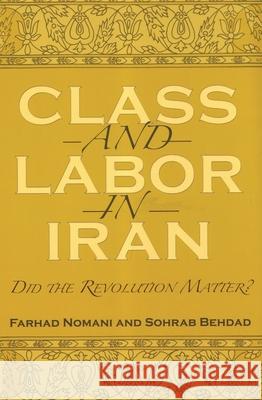Class and Labor in Iran: Did the Revolution Matter? » książka
Class and Labor in Iran: Did the Revolution Matter?
ISBN-13: 9780815630708 / Angielski / Twarda / 2006 / 268 str.
Class and Labor in Iran: Did the Revolution Matter?
ISBN-13: 9780815630708 / Angielski / Twarda / 2006 / 268 str.
(netto: 185,44 VAT: 5%)
Najniższa cena z 30 dni: 194,31
ok. 22 dni roboczych.
Darmowa dostawa!
In the past twenty-five years Iran has experienced a revolution and a turbulent post revolutionary period under an Islamic state that declared itself the government of the oppressed while it struggled to establish a utopian Islamic economy. In this pioneering work Farhad Nomani and Sohrab Behdad provide a comprehensive analysis of the dynamics of change and class configuration in Iranian society. Using a theoretical framework, they map the trajectory of class changes over time, specifically noting the movements between pre revolutionary and post revolutionary Iran. A centerpiece of the book is its analysis of the changes in the pattern of employment of women in the post revolutionary period. Despite its conceptual and quantitative approach, the book is written in a clear and lucid style, making it accessible to a wide audience. The authors provide a fresh look into Iranian society by exploring the changes in its essential underlying economic structure, and in doing so, the book lays the foundation for comparative studies of social hierarchy of labor in other Middle Eastern countries.











